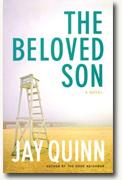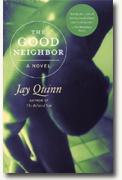author interview
book reviews:
· general fiction
· chick lit/romance
· sci-fi/fantasy
· graphic novels
· nonfiction
· audio books
· author interviews
· children's books @
curledupkids.com
· DVD reviews @
curledupdvd.com
newsletter
win books
buy online
links
home
for authors
& publishiss
for reviewers
The maga Portunista and her colorful subcommanders lead a ragged, outnumbered brigade in the wake of an international war, against her increasingly ruthless adversaries. But the ambitious commander finds herself irreconcilably drawn to a charismatic, kind and hopeful stranger. Click his e for more on Cry of Justice or read our review.
|
|||||
 
Michael Leonard interviewed author Jay Quinn about
his latest novel, exploring a bi-polar character, young adults flying back to
the nest, and the personal experiences that inform the protagonist in The Boomerang Kid Interviewer Michael Leonard: How did you decide on the subject of bi-polar disorder for this novel? Jay Quinn: Itís a subject I know a great deal about. I have had severe Bi-polar Disorder Type II since childhoodÖ in fact, from back in the day when received psychiatric wisdom believed children couldnít be diagnosed as ďmanic-depressiveĒ (as it was called back in the mid-1960s). Times, of course, have changed, but that doesnít give me back my childhood, which was quite difficult in terms of my mental health. I didnít want to write about a tormented childhood. I wanted to write about someone living with the illness today. At the same time, Iíve read many books dealing with direct personal experiences with Bi-polar Disorder. I wanted to write something very different to add to that body of work. What was your inspiration for Kai and for Maura? The genesis of the story began with thinking about what kind of son I would have had, if Iíd had one twenty-seven years ago. I suppose heíd be very much like Kai. As for Maura, thatís a little more complex. Maura is an amalgam of traits, habits and experiences, a great many of them mine. Kai reflects this perfect archetype of the ďboomerang kid,Ē one who keeps returning home time after time to seek emotional comfort and solace. One certainly gets the sense that this isnít the first time that Kai has run back to Mum. At twenty-seven, he still seems so brittle and unsure of himself. Do you think Kaiís troubles are purely chemical, or is there something far deeper at work? Well, in all fairness to the full range of boomerang kids, many of them return home out of financial necessity as much as anything else. In Kaiís case, heís rebounded home because itís the one place that will always take him in. I think thatís true for many of us. I donít think Kaiís troubles can all be laid at the doorstep of his tricky brain chemistry. Heís just made some really bad choices, and he is a little brittle mentally. This certainly affects his emotional state, but it also has an economic component as well. Thereís not really anything deeper at work. I most wanted to show what living with being Bi-polar is like. I think experiencing a narrowing range of options at critical junctures in life is part of that experience. Kai comes home because he literally has no other place to go where he feels safe. Like many of the characters in your previous novels, Kai is somewhat ambivalent sexually. Heís in love with Robin, yet he does have attractions to women, most notably Linda, his bad-girl dealer friend. In the light of this, what do you think this tells us about men like Kai? I think men find themselves along different points of the Kinsey scale at different times in their lives due to a variety of factors. I think homosexuality has far less to do with your choice of gender for sex and much more to do with where your deepest emotional connections are forged. Whom you chose to love can be a scary thing for a man whose identity is heavily invested in his own concept of masculinity. Love out of bounds makes one only human, though many guys deny the emotion while not denying themselves the sex. Kaiís problem lies with acknowledging he actually loves, romantically and physically, another guy. If it were just sex, it would be no big deal. Maura knows her son. She has waited all through his childhood and adolescence for him to confess to being in love, now here he is, finally suffering through what was really an adolescent emotion mixed with adult needs. In the light of this, why do you think Maura is so intuitive about Kai? Like many single parents of a single child, Maura is so intuitive of her son because heís been her responsibility his entire life. Sheís been responsible for feeding, clothing, educating, and nurturing him since he was an infant. Sheíd have to be an abnormally disconnected mother not to be so intuitive about her son.
Yes and no. I did create Kai to have a certain emotional immaturity due to his delayed experience of falling in love, but I do not see him as having any lack of independence whatsoever. To live as Kai has is to be very independent because you arenít ever certain of how much you can trust others with some parts of yourself that are very different. Actually, I think Kai is extremely independent. Crashing at his motherís house doesnít make him dependent, it just makes him desperate. Do you think Maura has ultimately come to terms with her sonís sexuality? Of course. Sheís far more concerned with his mental stability than his erotic life. In a way, she almost treats that part of his life as a kind of given considering his unique mental challenges. When she realizes that her beloved Kai is returning, Maura hits the cigarettes. What do you think this tells us about her state of mind? If you are a smoker, or an ex-smoker, when stressed, you want a cigarette. Itís a perfectly logical thing for her to do. In a small way, I created Mauraís smoking relapse as a milder form of Kaiís attitude toward casual drug abuse. A certain tendency toward addiction is something the mother and son share. Maura knows smoking wouldnít be good for the baby sheís carrying, yet sheís prepared to make that little compromise. Itís a very human flaw and human flaws make for three-dimensional characters. As a mother, Maura intuitively knows thereís something wrong with Kai, especially when she gets the worrying phone call from Rhett. When we first meet her, sheís content with her life. How do you think she balances her maternal concern for Kai with that of her own needs, her bourgeoning relationship with Matt and her recent news that sheĎs fifty-one and pregnant? Maura is a pretty strong woman. Sheís taken more than a few hits in her life and sheís still on her feet. Maura stands toe-to-toe with the reality of accepting things for exactly what they are and confidently forges ahead to do the right thing for herself and her son. Sheís not sentimental though she has deep reserves of empathy. I rather like her. You seem to get right into the core of Kaiís psyche, describing his mental illness as ďlike a fire, all flames and smoke and other times like embers glowing hot under the surface.Ē How difficult was it to get the heart of Kaiís thoughts and inner conflicts? It wasnít hard to ďget there.Ē What was hard was editing what itís really like into a coherent, bearable experience for the reader to relate to. The key was to make him someone else, not me, but of meÖ like a son would be. Similarly, how did you go about creating Mauraís internal thoughts and insecurities about her son, her relationship with Matt, her late-in-life pregnancy, and her feelings about her life in general? When I create characters, I see them physically first, that is, what height they are, their hair and eye color, their buildÖ once I have that, I see them in their physical environment, the rooms, furniture, lightÖ by then, I know how they think and feel about things. Itís hard to articulate, they just are. I know them. Itís as easy as having a conversation with someone youíve known all your life. I know which side of their face they shave first, what side of the bed they sleep on, what their childhood petís names were. I just intuitively know my characters. When I write, a characterís feelings and personality nuances are just there for me.
Look at Mauraís history with men. Itís not that varied and itís not that wonderful. Maura is very keyed to listening for the other shoe to drop. She hopes Matt will be receptive to her son, her baby, and their future together, but sheís had all of that swept out from under her before. Sheís wisely cautious. The novelís core revolves around conversations at dinner and at breakfast between Maura, Kai, and Matt as Kai embarks on a kind of circulatory ďconfessionalĒ with his mother. How difficult was it to propel your narrative forward when so much of the action is so static? Itís my contention that the largest moments of life are often encompassed in small moments. All of the tension in this book lies in relationships and self-exploration. In my experience, not a lot of self-exploration takes place while being shot at, out-running the police, or stepping between literal ice floes. Thatís not what my work is about. If a reader needs a shot of adrenaline with their self-examination, Iím not the writer for that reader. However, you bring up a good point. When the plot really is paced by the charactersí interactions and internal dialogs, I can see how you would think it is more difficult to move the novel forward. My writing is more inner-directed and itís how I tell stories. To use a cinematic metaphor, Iím more Ingmar Bergman than Steven Spielberg. Maura is nervous about having her son meet Matt. Yet sheís comforted by the fact that Kai isnít socially inept no matter what his mood.. Why therefore, do you think Maura is so hesitant for Matt to meet him? Well, who wouldnít be somewhat hesitant for your future to meet and get to know your past? So much of what we convey to new people in our lives about what has gone on with us prior to establishing that new bond is totally subjective. Maura now has a witness and evidence in the person of Kai who is a living, breathing manifestation of her entire world for the past twenty-seven years. If Matt were to not like Kai, in a sense, he would be saying he didnít like Mauraís life before she met him and he took it over. At first, Kai is suspicious of Matt and he views Mattís awkward questions as just another polite way of trying to get to know him. Yet over time, Kai seems to warm to Matt. What makes Kai begin to relax and feel so at ease with Matt? Matt is easy to like. I made him so. Heís a very confident, capable man. Kai responds positively to him to because Matt has extended him the same courtesy. Also, Matt is very pro-active in helping Kai out of the dead end Kaiís put himself into. When youíre sinking, youíll grab on to any hand put out to help. Matt is so wonderful and understanding about Kai even as he has initial reservations about integrating Kai into their lives. You describe him as ďa man of action, and not a lot for glib promises.Ē Maura and Kai are certainly vulnerable while Matt is undoubtedly strong. What then do you think are Mattís ultimate intentions with regard to Maura and Kai? Matt is smart enough to know Kai comes with the territory if he wants Maura. Itís a quite simple human trade off. People involved in loving relationships at middle age often have to accommodate otherís kids. Matt wants to make the best of it. In a sense, theyíre all forging a new hybrid family together, everyone is making an effort.
There was little research to be done. Iíve lived with Kaiís demons. Again, the difficult part was to make Kai someone new and not some Jay-manquť. It was all about restraint in trying to communicate the feelings of being Bi-polar in both a manic and a depressive state. Itís actually much worse than what I wrote, but it needed to be related with some regard. I had to make the raw, coppery taste of it palatable or risk going over the top. As for the richness of that mother/son bond, I am fortunate to have a great mother. I also felt tenderly for these two characters. They are each both strong and vulnerable in some poignant ways. That was the difficult part, creating that blend of strength and hurt. Both Maura and Matt have a modern and quite board-minded view of Kaiís relationship with Robin. Surprisingly, Matt is very accepting. Do you think their views are fairly symptomatic of their age group or are they out of the ordinary? I think their views are typical of people in their early fifties. Itís a time when life has beat you up a little and made you a bit less judgmental of other people. I believe Baby Boomers are much more live-and-let-live in their attitudes than their parents were. At fifty, I really donít give much of a damn what other people do, or think, as long as they leave me the hell alone. By middle age, you really donít want the drama or effort of carrying so much righteous indignation over things you canít really control. Maura and Matt have that attitude. Kaiís conundrum seems to be this strange mixture of the aesthetic and physical attraction he feels for Robin. Heís still conflicted about being known as gay, but he freely admits that he loves Robin. Indeed, heís constantly buttressed by Robinís unconditional love and support and his brain chemistry is ďflooded in a rush that is a physical fact of the state.Ē In the light of this comment, why do you think Kai falls so hard for Robin? Thereís someone for everyone, isnít there? No matter your personal challenges or bad history, someone comes along who embodies the possibility of having things you never knew you wanted. Kai has found that in Robin. I think Kai is as scared to admit heís susceptible to love as heís afraid of being known as gay. Robin knows this and doesnít use it against him. How could he not love Robin? Do you think Robin is really enough for Kai? Is Kaiís relationship with his pain-killers, those ďlittle blue pills,Ē more important than his relationship with Robin? That is the risk Robin takes, isnít it? Kai doesnít know himself, but heís willing to try. Ultimately the course of the relationship will be set by accommodation on both their parts. At one stage Kai talks about getting high and how it postpones the necessity for him to move forward a while longer. Moving forward means accepting responsibility for his life and for what he is going to make of it. Do you think Kaiís attitude is typical of someone who has to resort to drugs to get by? I donít think Kai is ďresortingĒ to drugs to get by. They are painkillers in a very literal sense for Kai. They help him deal with the pain of living in a way that his psych meds do not. I think Kai sees them as something that stills the storm in his mind and heís unafraid to use them for just that purpose, yet he knows theyíre forbidden and he canít rely on them forever. Forever doesnít concern him, right now does. His thinking is geared toward just getting through one day at a time, thatís why this larger commitment to Robin is so momentous for him. He is forced to think beyond his ability to project himself. Donít forget for a moment that Kaiís logic and attitudes are the product of a disorganized mind. A pivotal moment in the novel is when Robin calls Maura at work to check whether itís okay to come down for Thanksgiving. For the first time Robinís respectability is cemented in Mauraís eyes. Certainly Robin represents a free start and a new beginning for Kai. Does this gesture by Robin finally encourage Maura to let go, knowing that Kai is in good hands and with a good man? Mauraís initial impression of Robin is certainly favorable, but sheís still reserved about believing Robin is the complete answer to Kaiís issues. It certainly places a heavy responsibility on Robinís shoulders. Donít forget Maura bears the burden of her son both willingly and lightly. She cares deeply, but she also realizes how much is beyond her ability to make things right for him. I donít think sheíd be eager to place her own sense of obligation to Kai entirely on Robin.
Kai doesnít see people as having that much impact on his thinking. Being mentally ill is a very isolating experience. One sees otherís behavior and attitudes as somewhat perplexing given unorthodoxy of oneís own thinking. Normal people are interesting, but they exist at a sort of disconnect. I think Kai takes Bill Kellogg very much at face value. When Bill counsels him to take advantage of every moment with someone special because there are no guarantees in life, Kai takes him at his word. It would have been very easy for Bill Kellogg to have been less genial toward Kai, but remember, heís known him since he was a child. In that respect, Kai takes Billís avuncular nature for granted. Kai is far too self-absorbed to notice the impact Bill Kellogg has on him at the moment. Both mother and son have elements of selfishness. At one stage you remark that Kai lacks the fundamental ability to care about other peopleís feelings. ďHe had always taken care of himself first with an instinct for survival that was almost animalistic.Ē Thereís also a hint of Mauraís selfishness. Explain this in terms of both characters and the way they relate to each other through the course of the story? Iím not sure theyíre as much selfish as they are self-absorbed, but I think I understand where youíre going with the question. For both Maura and Kai as a family unit, itís always very much been them against the world. They are two people, joined by kinship and love, at odds with the rather unheeding world they find themselves in. Their experience is very much wrapped up in each other, Kai for his mother because of his special needs and his being the defining product of the great love of her life, Maura for Kai as sheís been the one person who attempted to bridge the distance he felt between himself and everyone else in the world. In so many ways, Maura and Kai have been in the bunker together. They are as much comrades in arms as they are mother and son. Throughout the novel, Maura is nagged by the mysterious, unseen thread of DNA that perhaps holds the chemical code for bipolar disorder. She so wants her ďJunebugĒ baby to be free of Kaiís torments. What do you think this tells us about her feelings towards Kaiís illness? It has everything to do with the very real threats that come out of nowhere to assault her and Kaiís lives. Maura is alone, from a very young age rearing her child with very little support from anyone. She even moves hundreds of miles from her own family to take a job that will allow her to support him. Kaiís illness is every threat to their existence manifested in a physical form. Worse, having a genetic component, itís almost as if itís a calamity Maura could have averted if sheíd only known how. The Bi-polar Disorder is almost a character, in and of itself. Donít mistake it for anything less than the boogeyman in her life. The emotional balance of the novel shifts once the preparations Thanksgiving dinner begin. Keeping this in mind, do you think Kaiís various revelations to his mother and to Matt allow the reader greater insight into the depth of KaiĎs mental plight? Iím not really sure how to answer that question. The simple answer is, of course it allows the reader greater insight into Kaiís mental challenges.. Itís how I built the narrative arc of the novel. As Maura becomes reacquainted with her son after a two-year absence, and Matt gets to know him free of anything more than what Maura has shared about him, the reader comes to know him as well. I hope I was successful in revealing what itís like for Kai to be Bi-polar in this exercise. How common do you think this problem is of emotionally damaged sons and daughters, who for whatever reason, are constantly compelled to return to the fold? I suppose itís a pretty common occurrence. I just searched ďboomerang kidĒ on Google and came up with 1,510,000 results in 20 seconds. Without a doubt, itís a social phenomenon and has been for a few years now. In The Boomerang Kid Yes. As Iíve said, these people are very close to me. And, I have to say I think love and redemption exists in this world. So much of contemporary literature is focused on the harm people do to each other emotionally, psychically, and physically. Great story conflict lies in ennui, hopelessness and rage. Thatís what fuels much writing. But I am not a nihilist. I write about ordinary lives that are imbued with the accomplishment of making it through life and coming to a sense of peace with it all. Perhaps Iím naÔve, but I try to promote a deeper understanding that comes from making it through the sturm und drang of contemporary life. How do you see the relationships in The Boomerang Kid Thatís not for me to say. That belongs to my readers. I wouldnít presume to take that away from them. After all, thatís the magic in a book isnít it? The unanswered questions, the sense of the life of the characters continuing on after youíve closed the book is what makes a book memorable and personal. Your novels are always about the different forms that human relationships can take. In the light of this, how do you think The Boomerang Kid Itís valedictory, in a sense. I think some of the themes Iíve written on have now all been thoroughly examined. I donít know how much more can be said about the bi-sexual nature of some men. Iíve pretty much featured that in three novels out of five, so I think I can leave that alone for now. Iíve also gotten the urge to write my Bi-polar novel out of my system. If anything, The Boomerang Kid
Itís how I see the characters. For me they are completely three-dimensional. The challenge is in editing them, not creating them. Chalk it up to my own tricky brain chemistry. Your previous novel, The Beloved Son dealt with issues of aging and dementia, yet there was also a similarity with this one. Will your next novel be a departure or revolve around similar themes? Can you share something about it with us? The next novel is definitely a departure. Itís about learning that resolving regret and moving on when you canít have what you want is a lifelong process. Iíve only just started work on it, so Iím reluctant to say more. I can say it will be a Jay Quinn book with its focus on the characters themselves. The many concerns surrounding bi-polar disorders can be difficult to grasp and are confusing at best, especially for those of us who have not been touched by this issue. In this respect, what would you like your readers to take away from The Boomerang Kid If they take away nothing else, it should be that love and redemption are available to anyone willing to embrace them. The right one comes around, sometimes more than once, and mothers and sons can appreciate one another as individuals outside expectations and obligation. Jay Quinn Jay Quinn is the author of Back Where He Started, Metes and Bounds and The Mentor. He lives in South Florida. Michael Leonard is a contributing editor of curledup.com. His interview with Jay Quinn was written in conjunction with his review of The Boomerang Kid. © Michael Leonard/2008.
|
|||||
| fiction · sf/f · comic books · nonfiction · audio newsletter · free book contest · buy books online review index · links · · authors & publishiss reviewers |
|
| site by ELBO Computing Resources, Inc. | |





